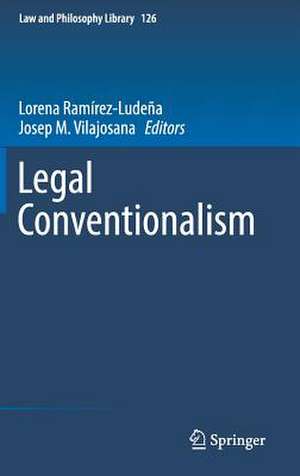Legal Conventionalism: Law and Philosophy Library, cartea 126
Editat de Lorena Ramírez-Ludeña, Josep M. Vilajosanaen Limba Engleză Hardback – 12 ian 2019
Din seria Law and Philosophy Library
- 20%
 Preț: 813.11 lei
Preț: 813.11 lei - 20%
 Preț: 569.00 lei
Preț: 569.00 lei - 18%
 Preț: 1225.16 lei
Preț: 1225.16 lei - 18%
 Preț: 950.66 lei
Preț: 950.66 lei - 15%
 Preț: 583.43 lei
Preț: 583.43 lei - 15%
 Preț: 639.25 lei
Preț: 639.25 lei - 15%
 Preț: 641.53 lei
Preț: 641.53 lei - 18%
 Preț: 893.84 lei
Preț: 893.84 lei - 24%
 Preț: 797.39 lei
Preț: 797.39 lei - 15%
 Preț: 579.84 lei
Preț: 579.84 lei - 15%
 Preț: 644.95 lei
Preț: 644.95 lei - 18%
 Preț: 895.76 lei
Preț: 895.76 lei - 15%
 Preț: 644.95 lei
Preț: 644.95 lei - 20%
 Preț: 571.85 lei
Preț: 571.85 lei - 15%
 Preț: 642.03 lei
Preț: 642.03 lei - 18%
 Preț: 1232.26 lei
Preț: 1232.26 lei - 18%
 Preț: 1116.05 lei
Preț: 1116.05 lei - 15%
 Preț: 655.92 lei
Preț: 655.92 lei - 18%
 Preț: 833.54 lei
Preț: 833.54 lei - 18%
 Preț: 898.26 lei
Preț: 898.26 lei - 18%
 Preț: 1016.63 lei
Preț: 1016.63 lei -
 Preț: 390.25 lei
Preț: 390.25 lei - 24%
 Preț: 700.89 lei
Preț: 700.89 lei - 18%
 Preț: 999.60 lei
Preț: 999.60 lei - 18%
 Preț: 1115.77 lei
Preț: 1115.77 lei - 18%
 Preț: 1107.88 lei
Preț: 1107.88 lei - 15%
 Preț: 637.46 lei
Preț: 637.46 lei - 18%
 Preț: 781.94 lei
Preț: 781.94 lei - 24%
 Preț: 815.54 lei
Preț: 815.54 lei - 18%
 Preț: 786.18 lei
Preț: 786.18 lei - 18%
 Preț: 735.21 lei
Preț: 735.21 lei - 15%
 Preț: 653.33 lei
Preț: 653.33 lei - 18%
 Preț: 782.10 lei
Preț: 782.10 lei
Preț: 891.80 lei
Preț vechi: 1087.56 lei
-18% Nou
Puncte Express: 1338
Preț estimativ în valută:
170.66€ • 179.45$ • 141.00£
170.66€ • 179.45$ • 141.00£
Carte tipărită la comandă
Livrare economică 17 aprilie-01 mai
Preluare comenzi: 021 569.72.76
Specificații
ISBN-13: 9783030035709
ISBN-10: 3030035700
Pagini: 210
Ilustrații: VI, 198 p.
Dimensiuni: 155 x 235 mm
Greutate: 0.47 kg
Ediția:1st ed. 2019
Editura: Springer International Publishing
Colecția Springer
Seria Law and Philosophy Library
Locul publicării:Cham, Switzerland
ISBN-10: 3030035700
Pagini: 210
Ilustrații: VI, 198 p.
Dimensiuni: 155 x 235 mm
Greutate: 0.47 kg
Ediția:1st ed. 2019
Editura: Springer International Publishing
Colecția Springer
Seria Law and Philosophy Library
Locul publicării:Cham, Switzerland
Cuprins
Part 1 The Notion of Convention.- Pre-conventions. A Fragment of the Background.- Re-examining Deep Conventions: Practical Reason and Forward-Looking Agency.- Part II Conventions and The Rule of Recognition.- Conventions, Reasons, and the Law.- The Rule of Recognition as a Constitutive Convention.- Social Facts and Law: Why is the Rule of Recognition a Convention?.- Cooperative Conventions, Rule of Recognition and Institutional Practices.- On Identifying the Law and Its Supposed Conventional Foundations. A Set-Theory Approach.- Part III Conventions and Legal Interpretation.- Conventionalism Unchained and Sceptical. A Defence of a Quasi-Realist Account of Legal Statements Against Dworkin’s Criticisms.- Conventionalism and the Causal Theory of Reference.- The Interpretation of Plans.
Notă biografică
Lorena Ramírez-Ludeña is Lecturer in the Law Department of the Pompeu Fabra University (UPF) in Barcelona. She holds a PhD in Legal Philosophy from the Pompeu Fabra University. She has been visiting researcher in prestigious universities such as the University of Oxford and Yale University. Her research interests include theories of reference, legal interpretation, legal positivism and objectivity in law. Her publications include books, articles and book chapters in well-known journals and publishers such as Springer, Doxa, Analisi e Diritto and Marcial Pons.
Josep M. Vilajosana is Professor of Legal Philosophy at Pompeu Fabra University (UPF) in Barcelona. His research lines include legal theory, legal system’s dynamics, conventionalism and the right to self-determination. He is the author of many books and articles on legal and political philosophy. From 2010 to 2016, he was the Dean of the Faculty of Law at the UPF.
Textul de pe ultima copertă
The concept of convention has been used in different fields and from different perspectives to account for important social phenomena, and the legal sphere is no exception. Rather, reflection on whether the legal phenomenon is based on a convention and, if so, what kind of convention is involved, has become a recurring issue in contemporary legal theory. In this book, some of the foremost specialists in the field make significant contributions to this debate. In the first part, the concept of convention is analysed. The second part reflects on whether the rule of recognition postulated by Hart can be understood as a convention and discusses its potential and limitations in order to explain the institutional and normative character of law. Lastly, the third part critically examines the relations between conventionalism and legal interpretation. Given the content and quality of the contributions, the book is of interest to those wanting to understand the current state of the art in legalconventionalism as well as those wanting to deepen their knowledge about these questions.
Caracteristici
Presents insightful thoughts on law and convention Offers a groundbreaking analysis of legal conventionalism by central experts Fosters an urgent debate on the conventional character of law
